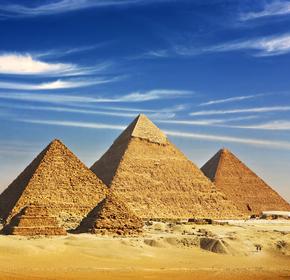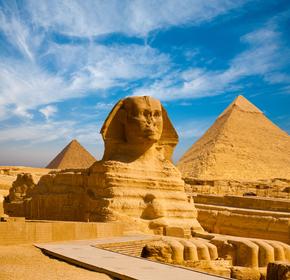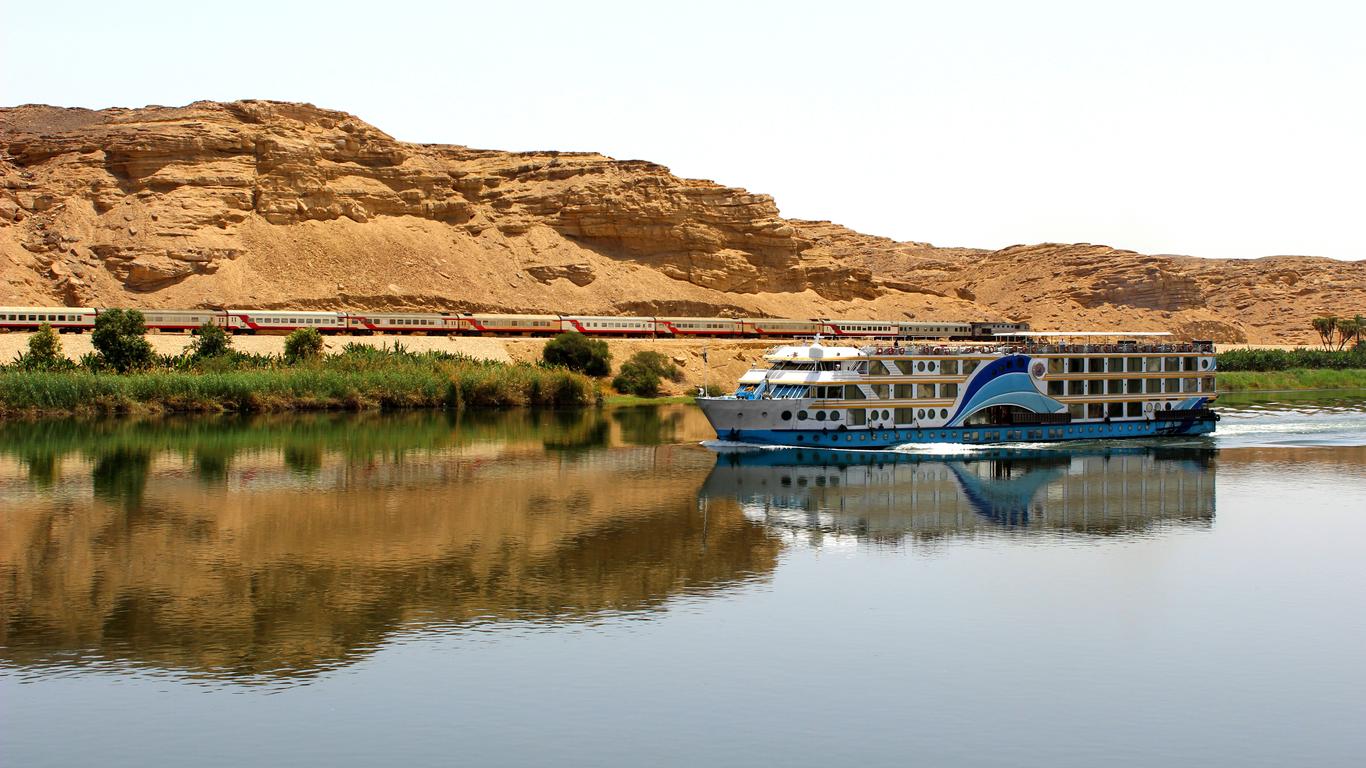
Cairo travel guide
Cairo Tourism | Cairo Guide
You're Going to Love Cairo
With its ancient monuments, medieval city, and modern skyscrapers, Cairo's timeline spans almost all of human history, and makes for one of the most exciting cities in the world.
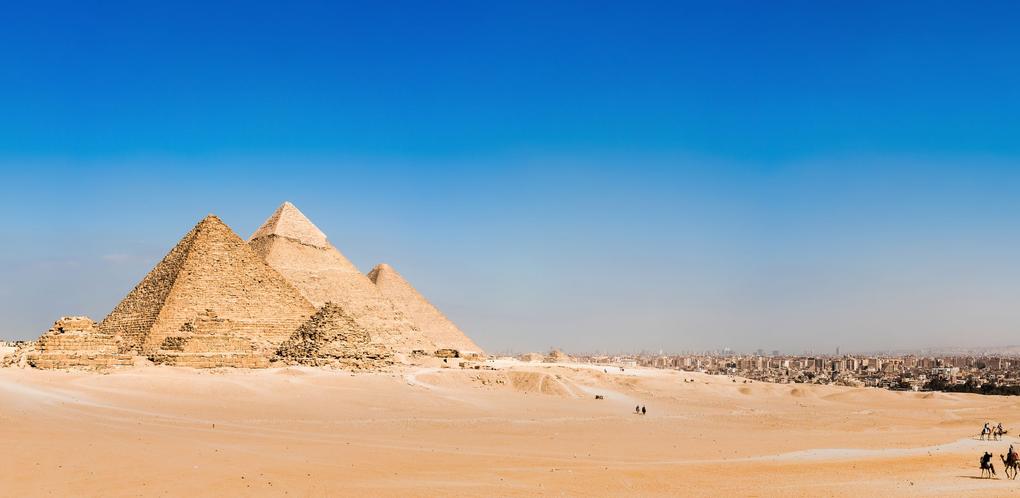
With 17 million inhabitants, it is one of the most populous cities in the world and its position on the crossroads between Europe, the Middle East, and Africa has contributed to a diverse and thriving culture.
You may come for the fabulous Pyramids at Giza, the last of the Seven Wonders of the Ancient World, but Cairo has even more to offer. You will be charmed by Midan Tahrir, known as the "Paris on the Nile", and fascinated by Old Cairo, home to Egypt's Coptic Christian community.
To soak up the atmosphere, try one of the traditional coffee houses or indulge in the famous local Sheesha water pipes. In summer, refresh yourself with a delicious drink from one of the countless fresh fruit juice stalls.
Top 5 Reasons to Visit Cairo
1. The Pyramids of Giza
No visit to Cairo would be complete without a visit to perhaps the most famous man-made structures in the world. Also featuring the enigmatic Sphinx, the Giza complex is easily one of the world's premier tourist destinations.
2. Saqqara Pyramid Complex
Saqqara has some of Egypt's oldest pyramids and is the site of the very first step pyramid, built by the famous ancient Egyptian architect Imhotep. It provides a stunning contrast to the Giza pyramids.
3. The Egyptian Museum
Most Egyptian artifacts have been removed from their original sites and the collection at the Egyptian Museum in the Midan Tahrir district has the world's most impressive collection of these treasures.
4. A Nile Cruise
The Nile is the lifeblood of Cairo and provides visitors with a cooling break from the hot city. You can choose from a luxury cruise lasting days or just a short trip on one of the many 'Felucca' boats, which can be chartered for 30 minutes or longer if desired.
5. Horseback Riding in the Desert
Riding out to the pyramids at sunset is a truly memorable experience. Many stables also offer overnight camping trips complete with barbecues and camping out under the stars.
What to do in Cairo
1. Great Pyramid of Giza: The Great Khufu
A Wonder of the Ancient World, the Great Pyramid of Giza is one of the most recognized icons known to humankind. This antediluvian tomb is mystical and awe-inspiring, a feat of engineering that has stunned visitors for thousands of years and is bound to stun you too. Behold the glorious relics of Egypt's old-world empire as you wander the expansive complex, and don't miss this bucket-list photo opportunity while you're there.
2. Great Sphinx of Giza: Guardian of the Tombs
The body of a lion and head of a human, the mythical Sphinx is a creature most have known since childhood - made famous by this limestone masterpiece. As much mystery has built up around the history of this sculpture as surrounds the enigmatic creature itself, and tourists are regaled with tales of its history through the ages. Dilapidated but regal as ever, the Great Sphinx will captivate you.
3. Egyptian Museum: Phaoronic Treasures
Egypt's ancient tombs and palaces may have been emptied out and looted, but priceless artifacts found within can still be seen in this incredible museum that rests on the banks of the Nile. Mummies, sarcophagi, masks and hieroglyphs fill these galleries with the nation's colorful history, all in spectacular contrast to the sandy tombs from whence they came. Tutankhamen's mask is the highlight of the collection, cast in pure gold.
4. Saladin Citadel of Cairo: Royal Grounds
Though the Pharoahs steal the show when it comes to Egyptian history, a visit to the fascinating Cairo Citadel is full of surprises that fill in the gaps. This medieval Islamic fort was built at the height of the Crusades to protect the city that it now overlooks with panoramic views. Elegant minarets, sweeping courtyards and lavish palaces transport tourists to another age as they explore the premises. You cannot miss the iconic Mosque of Muhammad Ali as it rises above the atmospheric ramparts.
5. Khan el-Khalili: A Medieval Mall
Teeming with locals and tourists alike, this sprawling souk at the heart of Cairo is full of Arab tradition. Souvenir stands, fine craft shops, food stalls and spice wonderlands comprise the sights and smells of these stimulating alleyways. The options are inexhaustible, and the local vendors love striking up a conversation. Get ready to haggle for the treasures that catch your eye, whether it be saffron, clothes, statues or a simple lemonade. Emerging from the fray, be sure to visit Al-Azhar Mosque too.
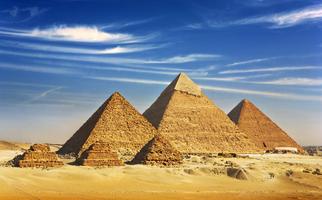
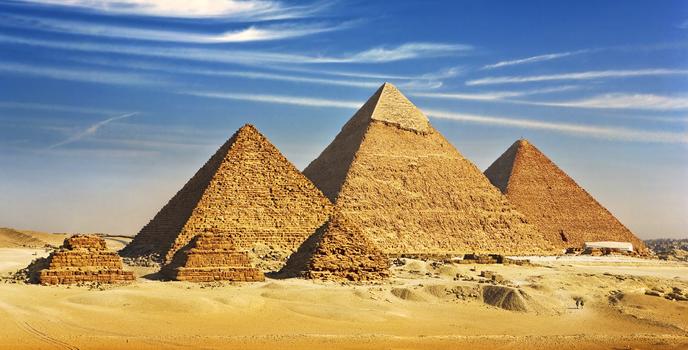


1. Great Pyramid of Giza: The Great Khufu
A Wonder of the Ancient World, the Great Pyramid of Giza is one of the most recognized icons known to humankind. This antediluvian tomb is mystical and awe-inspiring, a feat of engineering that has stunned visitors for thousands of years and is bound to stun you too. Behold the glorious relics of Egypt's old-world empire as you wander the expansive complex, and don't miss this bucket-list photo opportunity while you're there.
2. Great Sphinx of Giza: Guardian of the Tombs
The body of a lion and head of a human, the mythical Sphinx is a creature most have known since childhood - made famous by this limestone masterpiece. As much mystery has built up around the history of this sculpture as surrounds the enigmatic creature itself, and tourists are regaled with tales of its history through the ages. Dilapidated but regal as ever, the Great Sphinx will captivate you.
3. Egyptian Museum: Phaoronic Treasures
Egypt's ancient tombs and palaces may have been emptied out and looted, but priceless artifacts found within can still be seen in this incredible museum that rests on the banks of the Nile. Mummies, sarcophagi, masks and hieroglyphs fill these galleries with the nation's colorful history, all in spectacular contrast to the sandy tombs from whence they came. Tutankhamen's mask is the highlight of the collection, cast in pure gold.
4. Saladin Citadel of Cairo: Royal Grounds
Though the Pharoahs steal the show when it comes to Egyptian history, a visit to the fascinating Cairo Citadel is full of surprises that fill in the gaps. This medieval Islamic fort was built at the height of the Crusades to protect the city that it now overlooks with panoramic views. Elegant minarets, sweeping courtyards and lavish palaces transport tourists to another age as they explore the premises. You cannot miss the iconic Mosque of Muhammad Ali as it rises above the atmospheric ramparts.
5. Khan el-Khalili: A Medieval Mall
Teeming with locals and tourists alike, this sprawling souk at the heart of Cairo is full of Arab tradition. Souvenir stands, fine craft shops, food stalls and spice wonderlands comprise the sights and smells of these stimulating alleyways. The options are inexhaustible, and the local vendors love striking up a conversation. Get ready to haggle for the treasures that catch your eye, whether it be saffron, clothes, statues or a simple lemonade. Emerging from the fray, be sure to visit Al-Azhar Mosque too.




Where to Eat in Cairo
Cairo has a vast range of restaurants, from traditional Egyptian and Middle Eastern, to Asian and Western cuisine. The Downtown area is a good choice for budget eating and Egyptian street food, while Mohandiseen and Zamalek have a selection of more upscale eateries. Expect to pay under E£50 for a budget meal and up to E£300 in an upmarket restaurant. Koshary El Tahrir is a good budget chain for Egyptian food and Abou Shakra offers high quality Egyptian dining.
When to visit Cairo
The most popular time to visit Cairo is during the winter months, from November to March. During this time, the temperatures in the city are more moderate, ranging from 45 degrees Fahrenheit at night to 65 degrees Fahrenheit during the day. The spring months of March to May are a little warmer but are still pleasant for a visit. Fall temperatures are also reasonable but this is when the city's air pollution issues are worst. Summer temperatures can be searing but this is recognized by some discounted deals on hotels and resorts.
How to Get to Cairo
Plane
Cairo International Airport (CAI) is the city's main airport and the second largest in Africa. It is well served by a number of international carriers as well as Egyptair and some budget airlines, and lies around 12 miles to the northeast of Cairo city center. Public transport buses into the city can be difficult to navigate but there plenty of official white meter taxis and, now, Uber too. You can also book a limousine or a micro-bus to take you directly to your hotel for a fixed fee.
Train
Egypt has a reasonable rail network with Cairo as its hub. The main train station in the city is Ramses Station at Midan Ramses, which connects conveniently with the metro system. Regular train services connect the city with most major cities, including Alexandria, Aswan, and Luxor. Tickets should be booked in advance to guarantee a seat and visitors should reserve at least a second-class ticket, or preferably a first. Note that trains are almost always 15 minutes late or more and there is no train connection to the airport.
Car
It is possible to rent a car and drive to Cairo but it is not recommended for visitors. Local traffic laws can be confusing and are enforced with heavy fines. Local driving customs can also be challenging, with many cars driving without lights on at night and bumping cars to move them out of their way.
Bus
Egypt has an extensive bus network covering all major cities in the country. The main bus stations are at Midan Ramses and the newly built Cairo Gateway indoor station. Regular services run to Port Said, Alexandria, Sharm El Sheikh, Siwa, Taba, and Nuweiba. Micro-buses are cheaper but suffer from a poor safety record and foreign visitors are banned from using them on some routes. The bus station at the airport is in front of Terminal 1 by the parking lot.
Airports near Cairo
Airlines serving Cairo
Where to stay in Cairo
Midan Tahrir - this area was modeled on Paris and is the commercial center of Cairo. It is here that you will find the Egyptian Museum and the skyscrapers of the modern city.
Popular Neighborhoods in Cairo
Islamic Cairo - the historical center, it lies to the east of the Downtown area. Here you will find mosques and the main city market, or souq. The area abounds with medieval architecture and has some of the best Turkish baths in the city.
Zamalek - this is an upscale district on the Nile island of Gezira. It has a good choice of restaurants, shopping, and accommodation.
Where to stay in popular areas of Cairo
Most booked hotels in Cairo
How to Get Around Cairo
Public Transportation
Cairo has a large public bus network, with red, white, and blue buses. This covers the whole city but buses can be crowded. An air-conditioned bus prohibits standing and will charge E£2. The city also has Africa's largest subway (metro) system, charging a flat fare of E£1 per journey.
Taxi
Official Cairo taxis are all-white and use meters. They are usually more comfortable and cheaper than unofficial taxis. You will pay E£2 or E£3 on top of the fare for more than one passenger and an extra E£5-7 for night journeys. Uber cabs are common and efficient and remove the pain of haggling over the fare.
Car
Driving in Cairo can be frustrating, stressful and expensive. Expect to pay from E£900 per day for a compact vehicle, and companies like Sixt and Europcar are present in the city. Bumping from impatient drivers is common, so good insurance is a must. The huge parking lot at Tahrir Square has at least made city center parking easier but there are better ways to get around the city.
The Cost of Living in Cairo
Shopping Streets
The bazaar at Khan el-Khalili is the city's major souq and is quite an experience if you are confident of your haggling skills. Specialties include glassware and all sorts of crafts. Zamalek is a good district for high-end shopping and here you will find the Fair Trade Egypt store, selling local crafts.
Groceries and Other
You can buy groceries at any number of street stalls. If you prefer a more western approach to shopping, the City Stars mall is Cairo's largest retail complex, and it has a Spinney's supermarket. A quart of milk will cost around E£44 with two pounds of apples costing around E£18.5.
